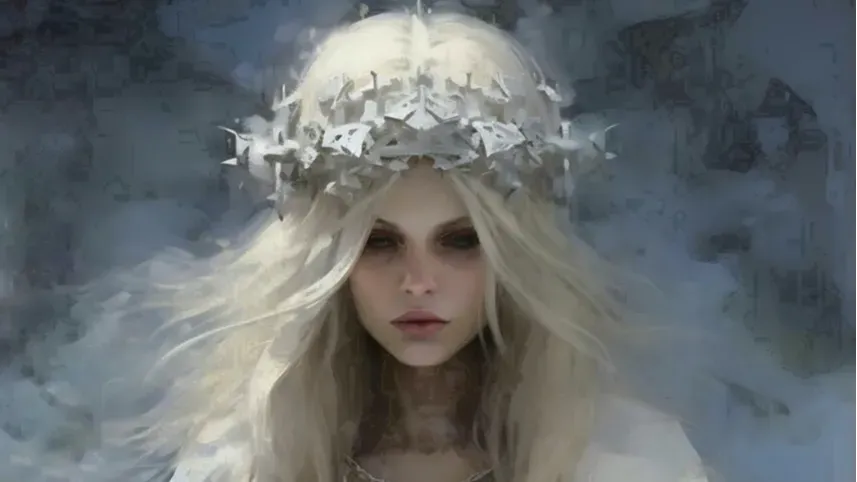Goddess for December
Perchta
She roams on the Rauhnächte, the darkest nights of the year, as she leads her entourage of spirits through flying snow across thundering skies as a leader of Das Wütende Heer — The Wild Hunt.
For centuries, she has been part of the darker side of Christmas.
She can appear as a beauty or a terrifying hag, and is both loved and feared. If you behave well, she will reward you. If you behave badly, she will cut out your entrails with the knife she carries beneath her skirts.
Roaming the countryside at midwinter, she enters homes during the twelve days between Christmas and Epiphany (Berchentag) especially on Twelfth Night. She dispenses rewards and punishments, paying particular attention to domestic order.
She punishes naughty children, but is also known for rewarding the pure of heart; old and young. Children would anticipate her visits with thrills of terror and excitement.
In ancient, pre-Christian times, Berchta was a powerful figure, worshipped by both Celtic and Germanic tribes. She was associated with the cycle of life, death, and rebirth. As a triple goddess, she was able to take on the forms of maiden, mother, and crone. She was depicted as a beautiful woman with long hair, wearing a white gown, and was often called The White Lady. She had a foot shaped like a swan’s foot, symbolic of her ability to shapeshift to animal form. She was said to appear as a swan, with the swan representing beauty, kindness, and loyalty; as well as being fiercely protective.
It was her sacred duty to protect babies, women, and children. She was associated with birch trees; in Old High German “birch” is birka which also means “bright”. As the White Lady, she would protect the forest and all its wildlife as both guardian and keeper. As protector of the animals, she was called “Guardian of Beasts”.
Known as a spirit who guides the dead into the afterlife, she was considered to be a goddess of the in-between — found between safety and danger, life and death, and, at Berchentag, between time; the old year and the new.
At Berchentag, January 6th, women would cook a special meal of gruel and fish, leaving an offering for Berchta. If she accepted the offering, the family would receive blessings and abundance for the year to come.
From the early Middle Ages, the Catholic Church held great power over Bavaria. When the people did not wish to give up their goddess, she became demonised by the Church. Her name ceased to mean “bright one” and now implied “hidden” or “covered”.
Officials began to speak out against Berchta, condemning believers for worshipping “Domina Perchta” instead of the Virgin Mary. By the 12th century, Perchta was portrayed as a fearsome hag who slit the bellies of naughty children. She may have been the inspiration for Krampus, the devilish counterpart to St. Nicholas, who emerged in folklore around this time. Berchta became “Perchta, leader of the Perchten”; perchten being her spirits who were now named as demons.
In 1468, church officials outlawed the Cult of Perchta in the Thesaurus Pauperum, forbidding offerings to be left during the Yule season.
The repression of the goddess Berchta continued throughout a dark time in European history. The years between 1450 and 1700 are known as The Burning Times, when prosecutions for the alleged crime of witchcraft reached their peak. Around 100,000 men and women were put to death for witchcraft; many of them burned at the stake.
By 1700, Berchta’s transformation into Frau Perchta was complete. She was the terror of Yuletide. All-seeing and merciless.
In her new role as extreme disciplinarian, Perchta was said to check on you during the twelve days between Christmas and Epiphany; especially Twelfth Night.
The meal of gruel and fish, once offered to Berchta, remained as a tradition. As Perchta, she could become irate if the meal were not prepared and eaten in her honour — a belly-slitting offence.
She would also be keen to see if the children of the household were well-behaved. If not, watch out! Perchta would know. And she would come for you . . . slit your belly right open and cut out your innards, replacing them with straw and stones. But you could receive a silver coin, if you had behaved well.
Domina Perchta indeed.
Yet still the spirit of Berchta remains.
A beautiful, bright Winter goddess who loves and nurtures children (as long as they behave). A deity who inspires children to do their best and guides the dead safely home.
______________________________________________
